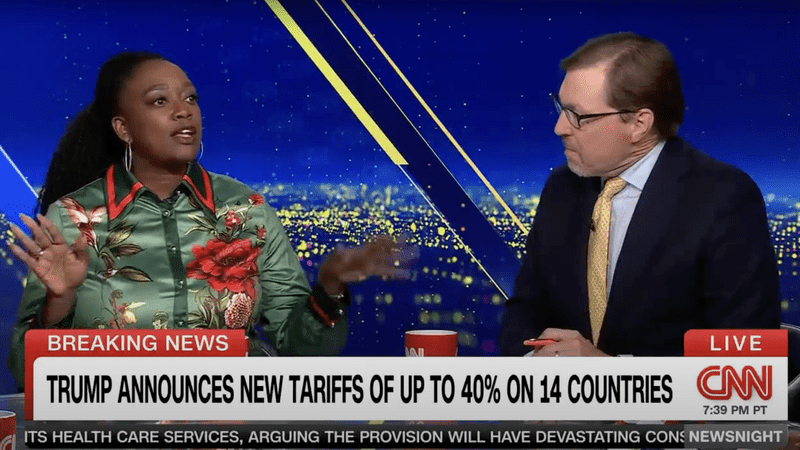The Debate Over Trump’s Tariff Policy Intensifies
A heated discussion unfolded on CNN’s “NewsNight with Abby Phillip” as a Republican strategist defended President Donald Trump’s recent tariff policy. The conversation took place on Monday night, following Trump’s announcement of new 25% tariffs on imports from South Korea and Japan—two of the United States’ largest trading partners.
The GOP strategist, Brad Todd, joined the show to argue that these tariffs are a strategic move aimed at protecting American interests. He claimed that the current global trade system is unfair, particularly when it comes to the treatment of American goods in foreign markets.
“German cars coming to America are tariffed at one-fourth the rate of American cars going to Germany,” Todd explained. “These kinds of barriers exist all over the globe. So, the president’s goal of reducing those barriers to American products is a good one. Going through long multinational processes didn’t work before, so he’s trying another way.”
Abby Phillip, the host, challenged Todd’s assertions by pointing out that Trump had previously renegotiated trade deals with Mexico and Canada during his first term in office. She questioned the effectiveness of the president’s current approach, which involves setting deadlines and then changing course.
“What is the proof that actually sitting down and negotiating in good faith does not work, and what is the proof that what he is doing now, which is setting deadlines and then pulling them back, is working?” she asked.
Todd responded by citing the U.S.-China trade relationship as evidence of the strategy’s success. However, Phillip countered that China has often ignored or dismissed Trump’s demands during negotiations.
“When Trump has said he wants to deal with China, they go to China and China basically brushes them off,” she said. “I’m not seeing the proof that this hardball strategy, even with China, is working.”
The exchange highlighted the growing concerns about the effectiveness of Trump’s trade policies, especially as they target key allies like South Korea and Japan. Critics argue that such measures could disrupt established trade relationships and lead to retaliatory actions from other countries.
Key Points of Contention
- Tariff Impact: The new 25% tariffs on South Korean and Japanese imports have raised questions about their potential economic consequences.
- Trade Negotiations: Trump’s approach to trade deals has been criticized for its unpredictability, with repeated changes in strategy.
- Global Fairness: Todd emphasized the need for fair treatment of American goods abroad, but critics argue that this approach may not be sustainable.
- China Relations: While Trump has taken a tough stance on China, there is little evidence that this strategy has yielded significant results.
Broader Implications
The debate over Trump’s tariff policy reflects a larger conversation about the future of international trade and the role of the U.S. in shaping global economic relations. Supporters argue that the administration is taking a necessary step to protect American industries, while opponents warn that such measures could lead to a more fragmented and less cooperative global economy.
As the discussion continues, many are watching closely to see how these policies will affect both domestic and international markets. With ongoing tensions between the U.S. and its trading partners, the effectiveness of Trump’s approach remains a topic of intense debate among policymakers, economists, and the public alike.







